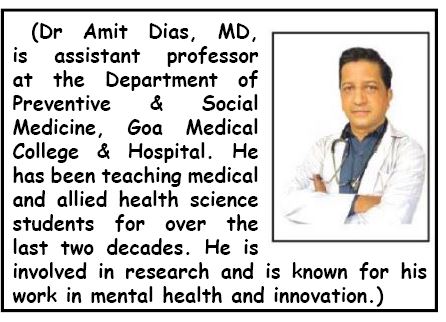An interview with Dr Amit Dias
As the season of BOARD exams draw near, so does the wave of stress and anxiety, affecting both candidates and their parents. In this context, the Goan Observer unveils the road to success in exams. Dr Amit Dias who has been teaching students for over two decades has some answers and tips on how to study and improve memory. He says, “The secret to success is in the word success itself.” Here is an a winning formula in an insightful interview which is essential reading for every student…
Goan Observer: Doctor, Let’s start by trying to decipher the secret formula to succeed in exams, if there is one.
Dr Amit Dias: There is no secret formula for success — it comes from preparation, hard work, and the ability to learn from failure. To simplify the path to success, I would break down the word SUCCESS itself:
S – Start Early: Begin your preparation well in advance to avoid last-minute stress.
U – Understand the Syllabus: Familiarize yourself with the exam syllabus to ensure comprehensive coverage.
C – Create a Schedule: Develop a realistic and organized study schedule and effective time management.
C- Consistent Revision: Regularly review, repeat, and revise the material to reinforce your knowledge.
E – Effective Study Techniques: Explore and adopt proven study techniques, such as summarizing, teaching, and using visual aids.
S – Stay Healthy: Prioritize your physical and mental wellbeing. Maintain a balanced diet, get adequate sleep, and engage in regular physical activity.
S – Seek Help When Needed: Don’t hesitate to ask for assistance if you encounter challenging topics. Teachers, peers, or online resources can provide support.
Q: In today’s world memory is important for success in exams, how to encourage children to focus, prevent distractions, and improve memory?
A: I agree. Getting children to focus and stay smart in today’s “smartphone world” is also a challenge. To be stress-free and yet perform well, one needs to understand that exam preparation is a multi-faceted process. Firstly, maintaining a healthy lifestyle is crucial. A balanced diet, staying hydrated, getting adequate sleep, and indulging in physical activity contribute significantly to cognitive function.
Establishing a consistent study routine and setting realistic goals are also essential. You need to brush up on your memory retention skills for which you need to understand the concepts and be familiar with the exam paper pattern. Quite often we come across students who know the answer but do not know that it was the answer to the question asked. Solving old question papers is a time-tested productive method for preparation. The best method is to be consistent with your studies all through the year, and not depend on last-minute work.
However, if for some reason, the candidate has not been so, it’s never too late to start.
Remember, the road to success starts from home….so create a good environment for the child to flourish to their highest potential. Do not compare them with others in their class, this hurts their self-esteem, ego, mental health and academic growth. They need to be the best version of themselves.
Q: You specifically mentioned the role of smart phones. What can be done to deal with it?
A: In today’s world we need to acknowledge the role of smart phones as a major source of distraction. I would advise keeping the phone away from the child. Asking them to have self-control once the addiction has begun, is asking for too much.
It’s a catch-22 situation. Smart phones can be a boon as well as a bane. On the one hand, you can access a lot of information, lectures, question papers and their solutions on the internet, and at the same time, the net will provide you with games, entertainment and pornography to distract you.
Students got access to smart phones and tablets after the COVID-19 pandemic where they had to undergo online classes. Some coaching classes are also online. One should consider using parental control apps on the phone to regulate its use in children.
Q: How can students enhance their ability to remember what they study?
A: Various study techniques work for different individuals. Active learning methods, such as summarizing information in one’s own words, highlighting the important points, making a summary, or creating visual aids like mind maps, have been proven to enhance memory retention. Start by asking yourself what you know about the chapter, then go through the questions at the end of the lesson, then start reading… and as you read, connect the matter with the questions you read. It will help fill in the gaps in knowledge and help retention.
Q: Can you further elaborate on some other useful techniques that can help our children?
A: Here are some of them that work and could be tried.
Say it loud: This is an effective method where the student says the keyword or the main headings aloud and in doing so you will be activating many senses and improving the retention.
Teaching someone: I found this to be the best method for retention. Read a topic and try teaching it to your colleague. You can do a mutual exchange and your colleague can teach you some other chapter. If you read to teach, the concepts will crystallize in your brain and you will remember it much longer.
Make Mnemonics: This is also another method to remember. Though I remember that while studying medicine, we had so many of them that quite often I would remember the mnemonic and not know how to expand them. Nonetheless, it is still a good method. My Very Educated Mother Just Served Us Noodles to remember the planets in order. BODMAS in mathematics is another good example.
Make mind maps: The human brain remembers things with visual connections. It can boost your retention by 10-15%.
All said and done there can be no substitute for consistent revision and spaced repetition also plays a vital role in reinforcing knowledge. There are various methods to remember the multiplication tables as well. So identify what you find difficult and find creative ways to remember it. Take the help of your teacher. Sometimes the process of asking your doubts to your teacher and getting an answer from them is an exercise that will help consolidate the information.
Q: Those are valuable strategies. Moving on, what, in your opinion, separates the brightest students from the rest, particularly during exams?
A: Every student is unique and no one can be called the brightest. It’s just that they need the right flame to burn their candle. Everyone can shine bright. Successful students often exhibit strong organizational skills, time management, and self-discipline. They are proactive in seeking help when needed and understand the importance of a well-rounded approach to learning, combining both depth and breadth in their studies. In today’s world, we also have children who are made “artificially intelligent” by various coaching classes. This brightness soon fades away with time.
Q: How about the subject of mathematics? Many students find it challenging. What tips can you provide for effective math study?
A: Mathematics requires consistent practice. Understanding the foundational concepts thoroughly is crucial. Solving a variety of problems and seeking help when needed can help build confidence. Additionally, visual aids and real-life examples can make abstract mathematical concepts more tangible and easier to grasp. Once again, there are various methods to help the child remember tables and formulae and the teachers should help students understand them. Teachers play an important role in helping the student love the subject. Once they love it, they will grow in it automatically.
Q: Excellent advice for tackling a challenging subject! As we approach the exam days, what steps can students take just before exams to optimize their performance?
A: In the days leading up to exams, students should focus on reviewing key concepts, practicing with past papers, and managing their stress levels. Adequate rest is crucial, as cramming can lead to fatigue and decreased performance. They should seek help if they are having difficulty.
Q: Speaking of stress, exam times can be incredibly stressful for students. How can they effectively deal with exam stress?
A: Developing effective stress management techniques, such as deep breathing exercises, mindfulness, and regular breaks, can help alleviate exam-related stress. Maintaining a positive mindset, setting realistic expectations, and seeking support from peers, teachers, or family members are also important aspects of stress management.
The impact of exams on mental health is substantial. High-stakes exams can lead to anxiety and depression in some students. Parents, teachers, and educational institutions must recognize the signs of distress and provide the necessary support. Promoting a culture that values overall well-being over purely academic achievements is essential.
Q: What is your final advice to the students?
A: Never dream of success — work for it!! If you fail, try again. I wish you all the very best in your exams. Remember what SUCCESS stands for and walk that path.

